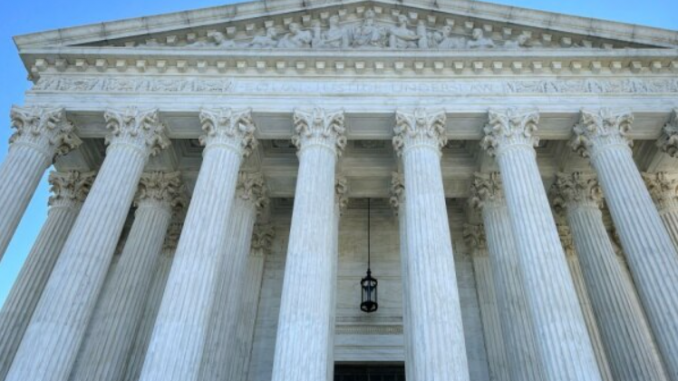
The Supreme Court has agreed to fast-track the appeal to block Texas’ abortion restriction, which was petitioned to the court by abortion rights advocates, CNBC reported Monday.
The case is pending in the U.S. Court of Appeals for the 5th Circuit, but an expedited appeal to the Supreme Court could bring the case before the high court as soon as December, according to the report.
For now, the petitioners for the appeal have until noon Thursday to file a response to the Supreme Court. Texas also has until Thursday to respond to the Justice Department’s appeal to the Supreme Court.
Texas’ recently passed law effectively bans most abortions past six weeks after conception by permitting lawsuits against abortion providers and anyone who “aids or abets” in the procedures.
Texas abortion providers and abortion rights activists filed an emergency appeal to the Supreme Court in August before the Texas law took effect Sept. 1, and the lawsuits and appeals have been bouncing through the lower courts since.
The Supreme Court ruled 5-4 late Sunday night against an emergency injunction to block the Texas abortion ban, but the Justice Department filed a lawsuit against Texas shortly after.
The DOJ, which filed suit last month in a bid to stop the law, told the Supreme Court in a filing that the 5th Circuit’s action enables the ongoing violation by the state of Texas “of this court’s precedents and its citizens’ constitutional rights.”
“Texas’ insistence that no party can bring a suit challenging S.B. 8 amounts to an assertion that the federal courts are powerless to halt the state’s ongoing nullification of federal law. That proposition is as breathtaking as it is dangerous,” the Justice Department added, using the formal name of the Texas law.
The Texas law makes an exception for a documented medical emergency but not for cases of rape or incest. It also gives private citizens the power to enforce it by enabling them to sue anyone who performs an abortion or assists a woman in getting one after cardiac activity is detected in the fetus.
That feature has helped shield the law from being immediately blocked by making it more difficult to directly sue the state.
Under the law, individual citizens can be awarded a minimum of $10,000 for bringing successful lawsuits. Critics have said this provision lets people act as anti-abortion bounty hunters, a characterization its proponents reject.
The Biden administration’s lawsuit argued the law impedes women from exercising their constitutional right to terminate a pregnancy as recognized in the Supreme Court’s landmark 1973 Roe v. Wade ruling that legalized abortion nationwide. It also argued the law improperly interferes with the operations of the federal government to provide abortion-related services.
In his Oct. 6 ruling blocking the law, District Judge Robert Pitman found the measure was likely unconstitutional and designed to avoid judicial scrutiny. Pitman said he would “not sanction one more day of this offensive deprivation of such an important right.”
The Supreme Court has a 6-3 conservative majority. When the court allowed the law to take effect, conservative Chief Justice John Roberts dissented along with the three liberal justices, expressing skepticism about how the measure would be enforced.
Roberts said he would have blocked the law’s enforcement at that point “so that the courts may consider whether a state can avoid responsibility for its laws in such a manner.”
The Supreme Court is already set to consider a major abortion case Dec. 1 in a dispute centering on Mississippi’s law banning abortions starting at 15 weeks of pregnancy, Mississippi has asked the justices to overturn Roe v. Wade. A ruling in the Mississippi case is due by the end of next June.
Information from The Associated Press and Reuters was used in this report.
Via Newsmax
